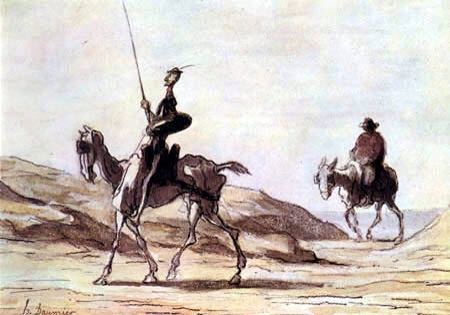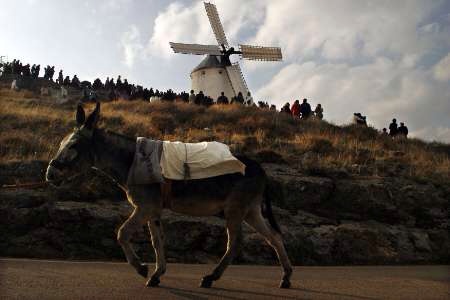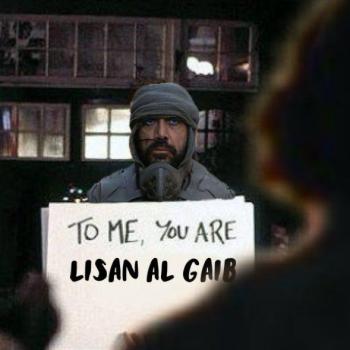Last week in my class “Faith, Doubt, and Reason” we began discussing Don Quixote, which the students had begun reading not long before. It was something of a puzzle to them what the connection was between the novel and the theme of the class. But the connections are there, and there are many of them.
For one thing, there is the question of the relationship between faith and sanity. It is hard not to consider how Quixote's life was shaped by reading particular stories as a potential parable of the religious life: texts and stories can transform us and we can live in light of them, and that is not necessarily insanity. But when those stories so shape our view that it distorts it, so that those we do not get along with for mundane reasons become demon-influenced enemies a la Frank Peretti, we may have crossed the line from sanity into something else.
It is not that being shaped by stories, having a worldview influenced by certain narratives is inherently crazy. But there is clearly a point, however blurry, at which we have gone too far.
This connects with the major focus of our class discussion the last time the class met: What is sanity/insanity? Several suggestions were offered. One was having a “distorted view of reality.” But we all fit that description – our eyes limit the wavelengths of light we see, and our minds limit the information of which we are conscious. Here too there is a spectrum. Another suggestion was “differing from what is accepted by a society.” But that seems potentially to blur cultural difference and insanity. Is that person standing too close to you, speaking too loudly, and gesticulating with their hands crazy, or Italian?
There is a line, somewhere, but delineating it precisely is hard, and that is to be expected. There are degrees of delusion and self-deception, and an extent to which a degree of them is inevitable as part of human experience.
So we focused next on another question. If being extremely deceived or deluded is (or is indistinguishable from) insanity, then how do we avoid having that happen to us? It was at this point that I was struck by the answer that students gave:
Doubt has been the least favorite of the three elements that make up the title of the class. Not that anyone is opposed to doubting – everyone doubts the truthfulness of hundreds of things people say that they a inclined to disagree with, and such doubt aimed at others is not incompatible with insanity. it is the doubting of one's own perspective that the students suggested is the key to avoiding delusion and insanity. As long as Quixote does not doubt that he is a knight, that windmills are giants, and other things he interprets in his unique way are what he thinks they are, not only is he out of his mind, but there is little hope that sanity and reality can get through to him.
And so it turns out that doubt is crucially important, and it is essential that, if we have been told that doubting the correctness of our assumptions and beliefs is inappropriate and destructive, we come to doubt that. Because unwillingness to do so eliminates one of the few effective means we have as human beings to remain sane and prevent strong and dangerous delusions from taking hold of us. Or at the very least, even if doubt may not be able to altogether innoculate us against loss of sanity, doubting our perception and our views seems to be something that indicates that we have not lost it yet.














